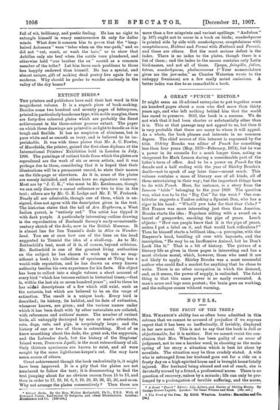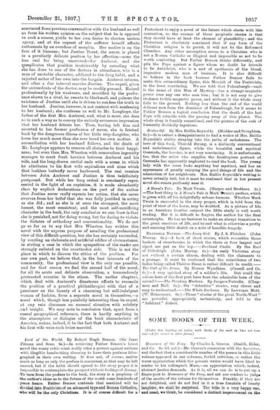NOVELS.
THE FRUIT OF THE TREE.t
MRS. WHA.RTON'S ability has so often been admitted in this column that we cannot be accused of prejudice if we express regret that it has been so ineffectually, if lavishly, displayed in her new novel. This is not to say that the book is dull or objectionable, for it is neither. But we cannot resist the con- clusion that Mrs. Wharton has been guilty of an error of judgment, not to use a harsher word, in choosing as the main- spring of her story a situation which is best let alone by novelists. The situation may be thus crudely stated. A wife who is estranged from her husband goes out for a ride on a frosty day on a high-spirited horse and is brought home fatally injured. Her husband being abroad and out of reach, she is devotedly nursed by a friend, a professional nurse. There is no question of recovery, unless by a miracle; life can only be pro- longed by a prolongation of terrible suffering, and the nurse, • A Great "Punch" Editor: Life, Letters, and Diaries of Shirley Brooks. By George 5cmee Loyard. London Sir Isaac Pitman and Sons. [18s. net.] V t Ths Fruit of the Tree. By Edith Wharton. London: Macmillan and Co. ea oonvinced from previous conversation with the husband as well as from his written opinion on the subject that he is opposed to such a course, yields to her own desire to shorten useless agony, and at the request of the sufferer herself effects euthanasia by an overdose of morphia. Her motive is on the face of it humane ; but Justine Brent, the nurse, is placed in a peculiarly delicate position by her affection—none the less real for being nuavowed—for Amherst, and she complicates that position irretrievably by revealing what she has done to one of the doctors in attendance, who is a man of unstable character, addicted to the drug habit, and a rejected suitor of her own into the bargain. Amherst returns, and after a due interval marries Justine. The sequel, given the antecedents of the doctor, may be readily guessed. Ruined professionally by his weakness, and mortified by the prefer- ence shown to a rival, he resorts to blackmail, and poisons the existence of Justine until she is driven to confess the truth to her husband. Justine, however, is not content with confessing to her husband ; she confesses as well to Mr. Langhope, the father of the first Mrs. Amherst, and, what is more, she does so in such a way as to convey the entirely erroneous impression that her husband detests her. Then, having left him and reverted to her former profession of nurse, she is fetched back by the dangerous illness of her little step-daughter, who loves her much more than she ever loved her own mother. A reconciliation with her husband follows, and the death of Mr. Langhope appears to remove all obstacles to their happi- ness; but even then Mrs. Wharton with remorseless ingenuity manages to erect fresh barriers between Amherst and his wife, and the long-drawn recital ends with a Beata in, which be attributes to his first wife aspirations and aims which that luckless butterfly never harboured. The real reunion between John Amherst and Justine is thus indefinitely postponed. But while her long ordeal is constantly repre- sented in the light of an expiation, it is made abundantly clear by explicit declarations on the part of the author that Justine never really repents her action, that she never swerves from her belief that she was fully justified in acting as she did ; and as she is at once the strongest, the most honest, the most consistent, and the most self-sacrificing character in the book, the only conclusion we can '!raw is that she is punished, not for doing wrong, but for daring to violate the dictates of orthodoxy and conventionality. We do not go so far as to say that Mrs. Wharton has written this novel with the express purpose of assailing the professional view of this diffieult question,. but she has certainly succeeded, by erecting an elaborate, and artificial edifice of circumstance, in stating a case in which the sympathies of the reader are strongly enlisted on the unorthodox side. This is not the place in which to discuss the ethics of the problem. For our own part, we believe that, in the best interests of the community, the professional view is the only one possible, and for that reason we find the second half of the novel, for all its acute and delicate observation, a tremendously protracted exercise in the otiose. The earlier chapters, which deal with Amherst's disastrous efforts to reconcile the position of a practical philanthropist with that of a pensioner on the bounty of a charming but self-indulgent woman of fashion, form a separate novel in themselves,—a novel which, though less painfully interesting than its sequel, at any rate discusses au unusual situation with subtlety and insight. . We may note in conclusion that, apart from a . casual geographical reference, there is hardly anything in the atmosphere or dialogue of the book characteristic of . America, unless, indeed, it be the fact that both Amherst and his first, wife were each twice married.















































 Previous page
Previous page